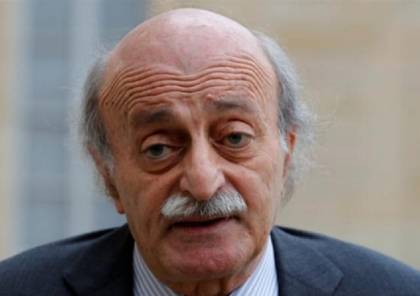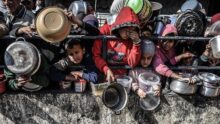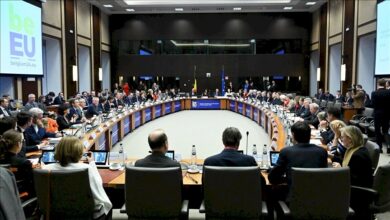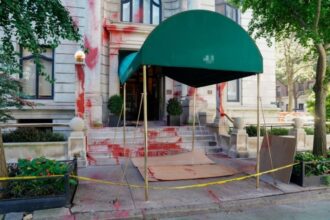Jumblatt: Washington presented Lebanon with an Israeli diktat to disarm Hezbollah and we cannot surrender
Al-Khamisa News Network - Gaza

Druze leader Walid Jumblatt said on Friday that what the U.S. delegation presented to Lebanon amounted to “an Israeli diktat that forces us to surrender.”
Jumblatt’s comments came in an interview with the Lebanese daily L’Orient-Le Jour, carried by the official Lebanese media agency, referring to a visit by a U.S. congressional delegation that included Senators Jeanne Shaheen and Lindsey Graham, Representative John Wilson, U.S. envoy to Syria Thomas Barrack, and Morgan Ortagus, counselor to the U.S. mission to the United Nations, on Tuesday.
The visit lasted two days and included meetings with Lebanese officials as part of talks on the government’s decision to confine arms to the state and the issue of Israeli withdrawal from five positions it occupied during the last war.
Asked about the substance of what the Washington envoys brought to Lebanon, Jumblatt said: “What was proposed to us is the Israeli diktat: remove Hezbollah’s weapons, and then we will see how to convince the Israelis to withdraw.”
He added: “We cannot be forced to surrender (…) We want to liberate the occupied lands and implement international resolutions, and focusing on the weapons will not be accepted by a large part of the Shia community.”
Jumblatt, who formerly headed the Progressive Socialist Party, stressed that “the solution is dialogue to persuade Hezbollah, because the party’s secretary-general Naim Qassem is right when he considers the party’s weapons to be the soul of its supporters.”
He continued: “The reality is that Israel has reinforced its positions in the south.”
ad
He pointed out that a large part of the disarmament process “is achieved south of the Litani, but the Lebanese army must be strengthened in numbers, equipment and the salaries of its personnel.”
Jumblatt noted that “the important thing is that the Israeli withdrawal takes place in parallel with any disarmament process (…) As for the army, it will not witness internal division, but we must avoid repeating the experience of using the institution against the people.”
On Wednesday, Hussein Khalil, the political aide to Hezbollah’s secretary-general, warned in a statement of what he called “deadly traps” by the United States aimed at setting the Lebanese army against the “resistance.”
Khalil accused Washington of “seeking to eliminate all elements of resilience and defense that Lebanon enjoys and to turn it into an American-Israeli colony,” according to a statement published by the official Lebanese news agency.
During his meeting with the U.S. delegation in Beirut, Prime Minister Nawaf Salam on Tuesday stressed that the path of confining arms to the state, extending its authority over its territory and monopolizing decisions of war and peace “has begun and there is no turning back.”
Salam affirmed that “this path is a Lebanese national demand and necessity, agreed upon by the Lebanese in the Taif Agreement above all else, but its implementation was delayed for decades and cost Lebanon many missed opportunities,” according to a statement from the prime minister’s media office.
In June, U.S. envoy Thomas Barrack presented a paper of proposals to the Lebanese government that included disarming Hezbollah and confining weapons to the state, in exchange for Israel’s withdrawal from five border positions it occupies in the south, and the release of funds earmarked for rebuilding areas damaged by the last war.
The Lebanese government made amendments to the paper before approving it in cabinet, where on August 7 it endorsed the “objectives of the proposal,” including the confinement of weapons to the state — a move that sparked a dispute with Hezbollah, which refuses to give up its arms before Israel withdraws from the occupied southern territories.
Clashes across the border between Israel and Hezbollah erupted in October 2023 and escalated into a full-scale war in September 2024, killing about 4,000 people in Lebanon, including the party’s former secretary-general Hassan Nasrallah, and wounding some 17,000 others.
On November 27, 2024, a ceasefire between Hezbollah and Israel came into effect, but Tel Aviv violated it more than 3,000 times, resulting in at least 282 dead and 604 wounded, according to official statements.
In defiance of the ceasefire agreement, the Israeli military carried out a partial withdrawal from southern Lebanon while continuing to occupy five hills it seized during the last war.
On the southern Syrian province of Sweida, Jumblatt said Sweida “is an integral part of the Syrian homeland,” calling for “the necessity of opening an investigation into the crimes that were committed, followed by reopening the roads between Damascus and Sweida.”
He added: “This is the responsibility of the Syrian state, but the Druze must also accept it (…) So far some voices within the community oppose this step.”
Jumblatt noted that “Lebanon faces a historic opportunity, especially since Syrian President Ahmad Sharaa clearly said that the Syrian regime is no longer in Iran’s orbit, and there is an independent Syria for the first time in more than fifty years, which is a major opportunity for Lebanon that must not be missed.”
Since July 19, Sweida has been under a ceasefire after a week of armed clashes between Druze groups and Bedouin tribes that left hundreds dead.
Following those clashes, the Damascus–Sweida road was closed until it could be secured.
The new Syrian administration has been making intensive efforts to restore security in the country since the overthrow of Bashar al-Assad’s regime on December 8, 2024, after 24 years in power.






